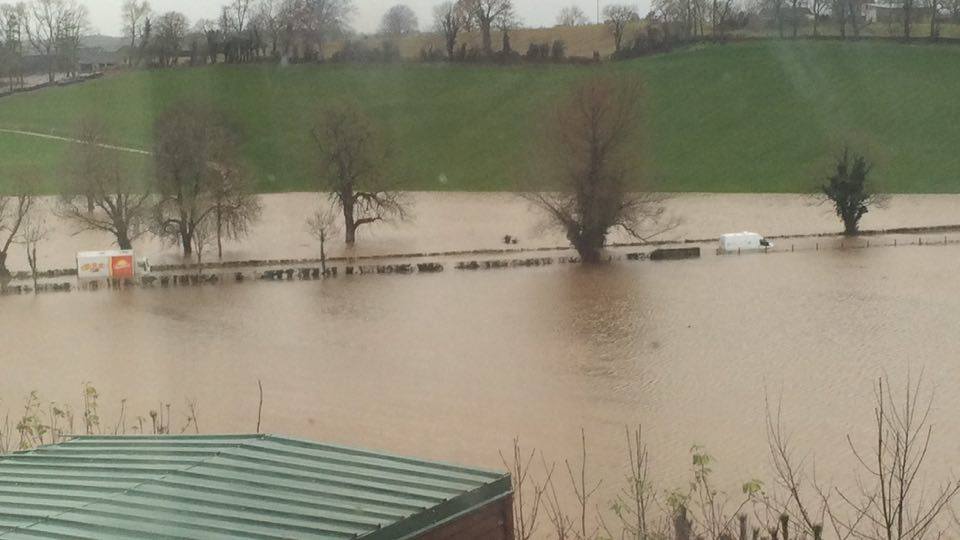
We hardly need Barra Best or Frank Mitchell to tell us it’s been a wee bit on the damp side out there lately.
But those good folk at Armagh Observatory have confirmed that December was, in reality, the wettest on record!
Yes, ever!
We’ve had Desmond, Eva, Frank and friends to thank for that fascinating fact…
Gertrude might have been all bluster and no real bite, with a weather warning cancelled by the experts when she failed to do her worst.
But by the looks of it, we’re in for more of the same flooding misery with more yellow weather warnings in place for rain across County Armagh as January continues.
Five days in and we are facing another warning for heavy rains with the potential for more floods.
It takes effect from 6pm tomorrow (Wednesday), and runs through until 6am on Thursday.
The Met Office warns up to 3cms of rain is likely to fall quite widely within a six to nine hour period, and anything up to 4cms on high ground.
The Met Office reports: “With the ground already being saturated, please be aware of the risk of local flooding and possible disruption to transport. Also note that icy stretches could form on untreated surfaces by Thursday morning as skies clear and temperatures fall, following the rain.”
Fantastic! Or not as the case may be.
While not a storm – no need to name it just yet then!! – it’s still looking like more turbulence ahead.
And at this rate of going we could be seeing Zebedee before spring’s out!
But while it has been the wettest December on record, it has also – rather strangely – been the warmest since 1988!
And, overall, 2015 as a whole was actually the coolest since 2010.
For the statistic-loving boffin, here’s the official line (some of it actually quite surprising but interesting nonetheless)…
Armagh Observatory, 5 January 2016: Armagh Observatory reports that December 2015 was much wetter than average, the wettest December on record at Armagh, that is, since records of daily precipitation began at Armagh in 1838. It was also much warmer, the warmest December at Armagh since 1988, and equal sixth-warmest December at Armagh since records of the daily maximum and minimum temperatures began at Armagh in 1843. The month was slightly duller than average, with 15 of the 31 days having no recorded strong sunshine at all.
Total recorded precipitation was 186.1 mm (nearly 7.33 inches), with no trace values, that is, some rainfall was recorded on every single day of the month. The long-term (1838-2010) average December precipitation at Armagh is 77.44 mm and the most recent 30-year (1981-2010) average precipitation is 77.23 mm. This shows that whereas the average December rainfall has hardly changed in nearly 200 years, last month’s record rainfall was 240% of the long-term average.
The five wettest Decembers on record at Armagh are now those of 2015 (186.10 mm), 1914 (181.35 mm), 1876 (170.19 mm), 1978 (165.85 mm) and 1852 (161.20 mm). The wettest day was the 29th with 31.1 mm (1.22 inches) of rainfall, and the second wettest day was Christmas day itself, with a total rainfall of 25.0 mm. This 2015 December 25th was the second wettest Christmas day on record at Armagh (beaten by 1956, with 25.9 mm).
The mean temperature (the mean of the average daily maximum and minimum temperatures) was 7.79 degrees Celsius (46.0 Fahrenheit). This was approximately 3.21 C higher than the long-term (1796-2010) average December temperature at Armagh and 2.86 C warmer than the most recent 30-year (1981-2010) average December temperature at Armagh, making this December the warmest since 1988. The five warmer Decembers at Armagh are those of 1857 (8.5 C), 1828 (8.3 C), 1934 (8.1 C), and 1842 and 1843 (both with a mean temperature of 7.9 degrees Celsius).
The warmest day (highest maximum daily temperature) was 14.8 C. This occurred on the 18th and was the equal sixth-warmest December day on record at Armagh (shared with 2nd December 1985). There were four December days with maximum temperatures above 14.0 C, namely the 18th (14.8 C), the 16th (14.4 C), the 19th (14.3 C), and the 15th (14.0 C). By contrast, the coolest day was Christmas Day itself, with a lowest maximum daily temperature of 5.1 C.
There were also several very warm December nights, that is, nights during which the temperature never fell below double figures. These exceptionally warm 2015 December nights were the 2nd and 17th (both with minimum temperatures of 11.1 C and now the equal fifth-warmest December nights on record at Armagh), and the 19th (10.9 C) and the 18th (10.3 C).
There were 13 ground frosts, the coldest of which was -5.2 C on the 13th, and two nighttime air frosts, that is, when the minimum temperature fell below freezing. The coldest night, also on the 13th, had a minimum temperature of -2.1 degrees Celsius.
December 2015 was slightly duller than average with a total of 38.6 hours of strong sunshine recorded at Armagh. This is approximately 95% of the most recent 30-year (1981-2010) average number of hours of strong December sunshine at Armagh (40.45 hours). The sunniest day was the 6th, with 4.5 hours of sunshine and there were 15 days with no recorded sunshine at all.
Taking the year as a whole, 2015 can be described as cooler and wetter than average, but slightly sunnier.
Despite the recent very warm November and December, and to a lesser extent October too, each of the previous months of 2015, namely January to September, were cooler or much cooler than the corresponding most recent 30-year (1981-2010) monthly average. The mean annual temperature for 2015 was 9.52 C (49.1 Fahrenheit), which is 0.19 C cooler than the most recent 30-year mean annual temperature at Armagh (9.71 C) and 0.46 C warmer than the long-term (1796-2010) average, which is 9.06 C. 2015 was the coolest year at Armagh since 2010.
Total precipitation was dominated by a few very wet months, namely May (60% wetter than average), August (approximately 50% wetter than average), and November and December (approximately 60% and 140% wetter than average). In contrast, June, September and October were relatively dry, each with roughly 50% or less than the corresponding month’s most recent 30-year average precipitation. The year as a whole, with a total precipitation of 951.7 mm (37.47 inches), was approximately 17% wetter than the most recent 30-year average annual rainfall at Armagh (813 mm).
The total number of hours of strong sunshine, 1387 hours, was approximately 11% greater than the most recent 30-year (1981-2010) average number of hours of strong sunshine, continuing a recent trend of there being slightly more sunshine at Armagh than the most recent 30-year annual average.
These data refer to observations at Armagh Observatory, which has been recording the weather at Armagh since 1795.
Read more news:
Police fear hundreds of thousands may have been stolen through skimming devices
Man rescued from county Armagh house fire
Man violently assaulted in forecourt of county Armagh supermarket
Gosford development plan to create NI’s ‘first five-star family forest park’
Club pays tribute to ‘well loved’ Michael McConville
No more new play parks in smaller areas across council borough





